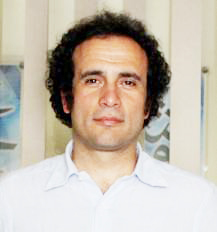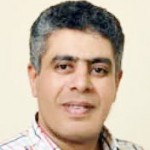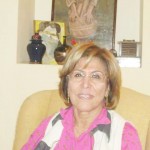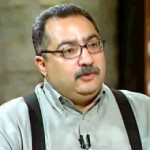Columnists tackled various issues indicative of the nascent and provisional state of Egyptian democracy, as well as the tentative and at times apprehensive attitude the country holds towards the future.
They relay fears of both internal and external transformations, and discuss the Egyptian political arena and its struggles to learn the rights and wrongs of political practice and the mechanisms of checks and balances, as well as the mandate of political opposition, how far they are entitled to take it and when to stop.
The Limits of Politics During National Holidays
Amr Hamzawy
Al-Watan
Amr Hamzawy criticises the refusal of some of Egypt’s political parties and groups to participate in the 6th of October celebration organised by the presidency. He urges Egypt’s political players to put matters into perspective, pointing to the fact that this is not a political meeting to be boycotted or opposed, but a celebration of a national holiday organised by the country’s legitimate, elected, civilian President.
The author argues that a president who came to power through democratic means, the first such president in the history of the Egyptian republic, should be supported in the celebration of a revered national holiday, regardless of the degree of political opposition any party may hold towards him, due to the nationalistic, apolitical nature of the event.
He adds that supporting the president in this celebration holds particular importance due to what it symbolises. In Hamzawy’s view, the celebration of Egypt’s greatest modern military victory by a civilian president is a sign that political power has finally been claimed by civilians, and that the Armed Forces can go back to their role of protecting the nation. Such a notion, believes Hamzawy, necessitates that political and electoral rivalries be placed aside for the good of the country.
The New Brothers
Emad El-Din Hussein
Al-Shorouk
Emad El-Din Hussein attempts to shed some light on what he identifies as the single biggest unidentified threat facing Egypt today, a phenomenon he labels the “new brothers.” According to Hussein, hypocrites and opportunists all over the country are now scrambling to board the train of the Muslim Brotherhood, which has become the most powerful political entity in the country.
The columnist provides the (presumably hypothetical) example of a man he knows who knew nothing of politics but joined Mubarak’s National Democratic Party in search of wealth and power. He writes that now that very same man has grown his beard and quit drinking in order to appeal to the newly-empowered Brotherhood.
Hussein claims that this example abounds around us today, in the relatively harmless form of those who seek to avoid police checkpoints and get away with other trifling offenses and gains, as well as in the truly dangerous form of high-level employees and officials attempting to get in the Muslim Brotherhood’s good books in order to reach positions of power and privilege.
Politicians, media personalities, and university professors who once claimed to be in opposition to the Brotherhood and their philosophies now shower praise upon them, writes the author, as they forget that their past words are archived and hope that public memory will be hazy.
Hussein warns the Muslim Brotherhood against repeating the error of their predecessors in power and mistaking these opportunists for true loyalists, labelling the “new brothers” the Muslim Brotherhood’s Achilles heel. He notes, however, that the Brotherhood seems to have taken notice of this phenomenon, and praises such awareness, cautioning them against letting their guard down.
The Constitutional Assembly and conflict of interest
Adel El-Sanhory
Al-Youm Al-Sabe’
Utilising the conflict of interest law allegedly being drafted by the state as an introduction, Adel El-Sanhory approaches an issue which he describes as crucial, and that is the presence of conflict of interest within Egypt’s constituent assembly, tasked with preparing the country’s new constitution.
He brings attention to the fact that more than a third of the assembly’s members have been appointed in what he claims are public executive positions, which he believes is compounded by the fact that the body’s political makeup is unbalanced to begin with.
He provides the example of Ambassador Mohamed Fahmy, who has recently found employment in the President’s office, as well Essam el-Erian, Emad Abdelghaffour, Omayma Kamal, Farouk Gueida, and several others, all of whom have been appointed advisors to the President.
He gives further examples, including newly-appointed ministers (such as Minister of Youth Osama Yaseen), governors (such as Governor of Monofeya Dr Mohamed Ali Bishr), and several high profile personalities, including Hossam El-Gheryani, Mohamed El-Beltagy and others, all of whom have been appointed to government positions.
The author is of the opinion that the appointment of more than a third of the Constituent Assembly’s members raises serious questions regarding the body’s neutrality and impartiality, particularly in light of the fact that many of the positions they have been appointed to entail proximity to the President. He believes that such an arrangement poses a threat to the integrity of the constitution-writing process of post-revolutionary Egypt.
The parallel threat
Farida El-Shoubashi
Al-Watan
Farida El-Shoubashi articulates in detail an increasingly held theory alleging a conspiracy that is attempting to expand the Gaza strip 30 kilometres into the Sinai peninsula, creating the Emirate of Gaza and entitling it to copious offshore natural gas resources in the process. She warns that such an Emirate would become richer than the state of Qatar.
Recalling a statement made by Sinai activist Mosaad Abu Fagr, claiming Islamist group Hamas represent a greater threat to Sinai than the state of Israel, El-Shoubashi laments the government’s lack of awareness regarding the conspiracy.
The author lambasts those who call for Christians who have been expelled from their homes in Sinai by extremists to return, pointing to the fact that the president himself did not go to Rafah in his recent visit to the peninsula, no doubt due to security concerns, despite being under heavy military protection; she assures us that Christian Egyptians would perhaps have more faith in the state if Christian Egyptian war heroes were given similar recognition to their Muslim equivalents.
The columnist calls for Egyptians to hold on to every last drop of water and grain of sand in the country, and not to avert their eyes from Sinai.
Let’s lie in ambush for the president
Ibrahim Issa
Al-Tahrir
Responding to constant complaints and accusations directed at the political opposition in Egypt for “lying in ambush” for the President, Ibrahim Issa does not deny the accusation, but rather embraces it as a necessary role of the political opposition in any respectable democracy.
Issa writes that it is the role of the opposition to track the president’s every move, criticise all that can be criticised in his actions and do all within its power to convince voters to vote otherwise in coming elections, and that these are actions that must be taken by any patriotic opposition force wishing to serve its country.
He adds that the oppositions constant critical eye keeps the president on his toes and forces him to recognise his flaws and his mistakes and correct them, rather than having them overwhelmed by a hypocritical and unnecessary shower of praise.
The Egyptian people, according to Issa, have become accustomed to deifying and worshipping their rulers as flawless, errorless pharaohs, a dangerous and destructive tradition, as the mistakes of rulers should only be overlooked in times of war for reasons of necessity.
The author warns against the Muslim Brotherhood’s attempts to shroud the president in a divine aura of religiosity and even divine providence, accusing the Brotherhood of spreading an intellectual virus among the population in order to seize control.
He also dismisses claims that the opposition’s “waiting in ambush” attitude towards the president is placing obstacles in his path and making his job more difficult; The opposition, Issa reminds, has no tangible method of inhibiting or challenging the president in any way, particularly after the dissolution of parliament, which left the president with what Issa calls “emperor-like” powers.
Employing harsh, mildly derogatory language, Issa describes accusations of “lying in ambush” for the President made by his supporters as weak attempts to blame the opposition for his failures.






